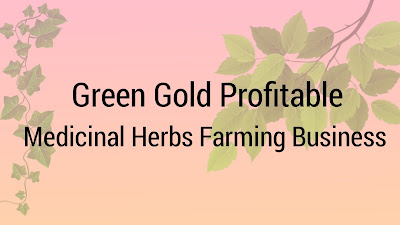Medicinal herbs have been highly valued for their healing properties for centuries. The demand for these herbs continues to grow as people seek more natural and holistic health solutions. This has created a lucrative opportunity for farmers interested in herb cultivation.
One specific niche within the medicinal herbs market is profitable farming of "green gold" herbs. These are herbs that have a high market value due to their medicinal properties scarcity or unique qualities. Here are a few examples of profitable medicinal herbs that can be grown for a profitable farming business:
Starting a profitable medicinal herbs farming business can be a rewarding venture. Here are some details to consider:
1. Research and Planning:
- Begin by researching the demand for specific medicinal herbs in your region and identifying which herbs are most profitable.
- Create a detailed business plan outlining your goals, budget, and marketing strategy.
2. Selecting Medicinal Herbs:
- Choose herbs that are in high demand and can thrive in your local climate and soil conditions.
- Consider cultivating herbs like lavender, ginseng, or echinacea, which have strong market potential.
3. Location and Soil Preparation:
- Select a suitable location with good sunlight and well-draining soil.
- Prepare the soil by testing and amending it as needed to ensure optimal herb growth.
4. Cultivation and Maintenance:
- Follow best practices for planting, spacing, and irrigation.
- Implement organic farming methods to meet the demand for chemical-free herbs.
- Regularly monitor and care for your plants, including pest control and disease management.
5. Harvesting and Processing:
- Harvest herbs at the right time to maximize their potency.
- Develop a drying and processing system to preserve the herbs' quality.
6. Legal Requirements:
- Check local regulations and obtain any necessary permits or licenses for herb farming.
- Ensure compliance with organic certifications if applicable.
7. Marketing and Sales:
- Establish a strong online presence and create a website to showcase your products.
- Explore local farmer's markets, health food stores, and herbalists as potential sales channels.
- Consider exporting if there is international demand for your herbs.
8. Financial Management:
- Keep detailed financial records to track expenses and revenue.
- Set competitive pricing based on market research and production costs.
9. Scaling and Expansion:
- As your business grows, consider expanding your herb varieties or acreage.
- Invest in marketing and branding to build a reputable herb farm.
10. Sustainability Practices:
- Implement sustainable farming practices to appeal to eco-conscious consumers.
- Consider adding value by producing herbal products like essential oils, teas, or herbal supplements.
11. Networking and Education:
- Join local farming associations or herb-related organizations to stay updated on industry trends.
- Continuously educate yourself about new cultivation techniques and herb properties.
12. Risk Management:
- Develop a risk management strategy to mitigate potential losses due to weather, pests, or market fluctuations.
Remember that success in the medicinal herbs farming business may take time and effort, but with dedication and proper planning, it can be a profitable and fulfilling venture.


Post a Comment
0Comments